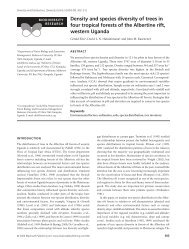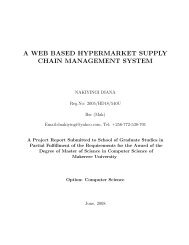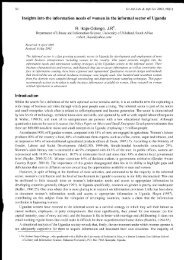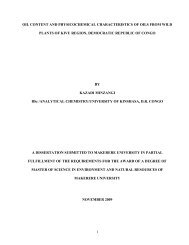THE UNIVERSITY OF LEIPZIG
THE UNIVERSITY OF LEIPZIG
THE UNIVERSITY OF LEIPZIG
Create successful ePaper yourself
Turn your PDF publications into a flip-book with our unique Google optimized e-Paper software.
The above revelations show the discontencies and suspicions that are contained in the poor<br />
nations’ perceptions of bio-prospecting multinational corporations. As a result, the proponents<br />
of the sovereignty notion have demanded that, in order to revisit this inequality, bioprospecting<br />
corporations have to strengthen the source-country capacities. This is envisioned<br />
as a move to add value to resources extracted in these countries. On the whole, sourcecountries<br />
advocate for improved local capacity through pharmaceutical production,<br />
conservation of biological diversity, and enhancing of local community development of<br />
diversity. 74 On the other hand, countries that subscribe to this notion, have appreciated that<br />
part of the problem lies in their national biodiversity management systems. 75 There are no<br />
laws relating to biodiversity and this makes them vulnerable to the unscrupulous international<br />
contractual relationships. The Convention for Biodiversity recognizes the sovereign rights of<br />
states to determine and define access to resources. 76 As a result many of the countries,<br />
especially those from the resource rich south, have undertaken various strategies for managing<br />
their biological resources. As far as laws are concerned, different countries have undertaken<br />
different interventions. These include; enacting of guiding environmental principles in their<br />
constitutions, use of anti- pollution laws and creation of laws, on the use of natural resources<br />
and biodiversity. 77<br />
Therefore, arising from the view that there ought to be streamlined procedures followed in the<br />
usage of biodiversity, especially in the realm of bio-trading and bio-cooperation, many<br />
countries have come up with legal frameworks for managing and regulating biodiversity<br />
usage. Many countries have developed laws in relation to biodiversity on a sectoral basis. In<br />
Kenya for instance, there is a continued debate regarding the sectoral usage of biodiversity<br />
and a call for increased legal enforcement. The sectoral framework laws often incorporate<br />
general principles of environmental management, inherently providing an institutional<br />
framework for the management of biodiversity. 78 Arising from the sovereignty notion, states<br />
have put in place diverse mechanisms to implement broader objectives of their national<br />
policies. Most states have based their management policies on the control of biological<br />
resources in the interest of the public. Many countries have undertaken to establish protected<br />
areas’ management framework as a method for managing in-situ conservation. They have also<br />
set up trade measures such as permits for the usage of ex-situ biodiversity. In other instances<br />
74<br />
Posey, D.A. 1996. Traditional Resource Rights: International Instruments for Protection and Compensation of<br />
Indigenous People and Local communities. Gland: IUCN<br />
75<br />
BIOTA. 2004. www.biota-africa.org. 25.10.2006<br />
76<br />
Newman, D.J and S. A Laird. 1999. The Influence of Natural Products on the 1997 Pharmaceutical Sales<br />
Figures. In The commercial Use of Biodiversity: cess to Genetic Resources and Benefit Sharing, edited by K.<br />
Kate and S. A Laird, 333-335. London: Earth scan.<br />
77<br />
Lal, D. 1998. Unintended Consequences: The Impact of Factor Endowments, Culture and Politics on<br />
Economic Performance in the Long run. The Ohlin Lectures. Cambridge Mass: MIT Press.<br />
78<br />
Calestous, J. 1991. Managing Biological Diversity in Kenya. In Gaining Ground: Institutional Innovations in<br />
Landuse Management in Kenya, edited by A Kiriro and C. Juma, 27-38 Nairobi: African Centre for<br />
Technology Studies.<br />
19






